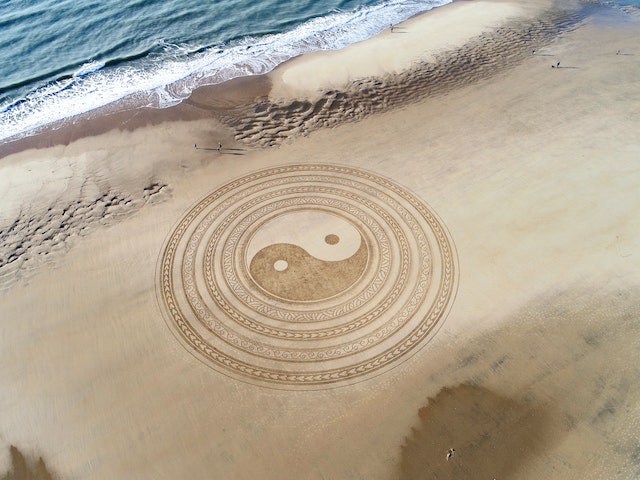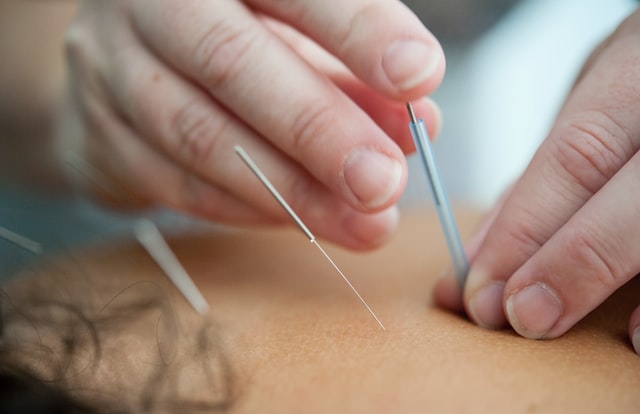Traditional Chinese Medicine (TCM)
Mental distress is on the rise. And many people have experienced low mood, anxiety, stress, or a combination of all three in the last month or year. With many undesired side effects, medication is not always the first choice to begin the healing journey. It seems that there is a slow change happening in health care systems that includes finally asking better questions about mental health distress and collaborating with clients to support their individual healing. Holistic therapies, like Traditional Chinese Medicine (TCM), could be something to try.
On the podcast this week, I was joined by Catherine Davis. She is a Licensed Acupuncturist and Chinese Herbalist with a passion for holistic and energy healing. When she was a teenager, she discovered the amazing benefits of acupuncture for herself in her search to overcome her digestive problems and anxiety. Catherine initially enrolled in a nursing program, but was ultimately disappointed by the amount of waste generated in western medicine, particularly in hospitals. Instead, she decided to pursue holistic healing and acupuncture, leading her to what she does now.
I have to be honest, I was terrified of acupuncture because of the needles. And even though I had heard great things from my family and friends, I put it off for many years.
An ancient healing system
After I injured my foot, I kept reading about acupuncture online and eventually tried acupressure and then laser acupuncture. Over the years, I slowly made my way to acupuncture and eventually found a fantastic practitioner who helped me with my initial hesitation. Acupuncture has been super effective in helping alleviate chronic pain and the recurring swelling in my foot. I also tried it for menopause symptoms like hot flashes - with great success.
“The Chinese do not draw any distinction between food and medicine.”
- Lin Yutang
Traditional Chinese Medicine (TCM) is a holistic healing system, and as such encompasses various techniques. These can include therapies like acupuncture that stimulate points along the body's meridian lines to help with mental and emotional distress.
What is Traditional Chinese Medicine?
Traditional Chinese Medicine has been used to diagnose, treat, and prevent disease for more than 2,000 years. TCM makes up an entire ancient healing system. The foundation of TCM is the yin and yang theory, which incorporates opposite energies such as summer and winter, earth and heaven, joy and sadness. When yin and yang are balanced, you feel peaceful and balanced. When yin and yang are out of balance, you can experience physical, mental, and emotional distress.

TCM literature first appears in written form around 200 BCE. Traditional Chinese scriptures contain descriptions of the theory, practice, and diagnosis, including treatment of acupuncture and herbal medicine. Some approaches have been refined and expanded on over many years. Although Traditional Chinese Medicine has been practiced for millennia in China, it was much less known and accepted in the US. Chinese immigrants have practiced TCM in the US since roughly the middle of the 19th century, but before the 1970s, most Americans were unaware of its existence.
James Reston, a correspondent for the New York Times, needed emergency surgery for his appendix, while covering former President Nixon's visit to China that year. He had acupuncture for pain relief following the procedure, and the public was captivated by his tales of this encounter with Traditional Chinese Medicine. Since then, TCM has developed into a widely-used alternative therapy. Acupuncture, herbal medicine, food, movement, and manual treatments comprise the five basic categories of TCM.
Traditional Chinese Medicine AND mental health
Traditional Chinese Medicine has employed a variety of approaches to help with mental and emotional distress from its inception. These include food or lifestyle suggestions, herbal remedies, and manual therapies like acupuncture. Acupuncture, in short, activates energy points along the body's meridian lines. Sometimes energy is blocked and the points need to be freed up to restore energy flow. Other times energy may be too strong or too weak and acupuncture can help balance it.
Many individuals who experience low mood, anxiety, or stress seek TCM treatments because it can be a gentle first step in the healing journey. According to research evaluations, acupuncture can effectively help with sadness and anxiety when used alone or in conjunction with other therapies. Studies also show an increase in dopamine and noradrenaline, two mood-regulating neurotransmitters, and a decline in inflammation. Low mood and anxiety have a complex combination of underlying causes, some of which can include neurotransmitter imbalance and inflammation.

For example, women going through menopause have a higher chance of developing depressive symptoms. A study of 85 women found that Bushen-Shugan herbal granules used in combination with Traditional Chinese Medicine-based psychotherapy effectively decreased minor mental and emotional distress associated with menopause. In addition to reducing traumatic and depressive symptoms, herbal medicine and psychotherapy also substantially reduced certain physical symptoms.
According to a review of studies, TCM herbal remedies for postpartum depression offer effective alleviation, with the best results shown in conjunction with western therapies like psychotherapy. These tangible benefits affected mental and emotional wellbeing, while the herbal remedies also affected hormone rebalancing, lowering excessive progesterone while raising estrogen.
WORking with a practitioner
Traditional Chinese Medicine practitioners, like Catherine Davis, address the patient as a whole, instead of just looking at the symptoms, by analyzing the underlying imbalances that lead to symptoms in the first place. The body has the incredible, natural capacity to heal itself, and TCM supports that view. For instance, acupuncture “wakes up” the body's nervous system and prompts the release of endorphins and the body's natural painkillers.
Acupuncturists can help with a wide variety of complaints and research continues into specific illnesses and how they respond to acupuncture. Recent National Center for Complementary and Integrative Health (NCCIH) research shows that acupuncture can relieve knee, back, neck, and headache pain brought on by osteoarthritis. This would give clients a holistic approach to start addressing their pain, instead of reaching for a bottle of painkillers.

To assist the body's innate ability to heal itself and restore, refresh, and promote optimal health, TCM practitioners can help you with a wide range of modalities, including acupuncture, herbal medicines, cupping, therapeutic massage, moxibustion, gua sha, and even sound therapy. Each therapy session can build on the one before it, bringing you closer to a healthy and balanced state.
Since mental wellbeing can be tied to many physical symptoms and vice versa, it is important to consider the body and mind as one holistic system. Traditional Chinese Medicine practitioners and acupuncturists frequently treat pain and disorders in the nervous system, including numbness, tingling, and pinched nerves, as well as fertility or helping with conception, migraines, vertigo, irregular menstrual cycles, and skin conditions like rashes or acne. It becomes apparent that TCM can really affect the whole body and all of its organs and systems.
The Takeaway
Traditional Chinese Medicine is a natural, comprehensive medical system that dates back thousands of years to ancient China and is still, or should I say “again”, used worldwide.
TCM practitioners can help clients with a variety of problems, including chronic pain, exhaustion, headaches, infertility, and hormone imbalances, using herbal medications, mind-body techniques like tai chi, acupuncture, massage treatment, and diet.

Traditional Chinese Medicine stimulates your body's natural ability to repair and heal itself. It does this by enhancing your energy and immunity, reducing pain, rebalancing your internal systems, enhancing the health of your vital organs, reducing stress and anxiety, and even preventing the onset or progression of many diseases.
In my opinion, the most important thing you can do for yourself is to become your own health advocate.
Especially with mental distress, options for help may seem limited and you may perceive a certain negative stigma for seeking help. But, it is your body and your life, so it is important that you advocate for your own wellbeing and health. If this means seeing your doctor, make that a priority. If you would rather try an acupuncturist, make an appointment. You deserve to be healthy and feeling at your best and the only way that will happen is if you look for answers and healing options.
Whether Traditional Chinese Medicine ends up as part of your healing journey or not, I hope you find approaches you feel comfortable with and that bring you healing!
Axe, J. (2018, June 24). The Benefits of Traditional Chinese Medicine. Dr. Axe. Retrieved September 15, 2022, from https://draxe.com/health/traditional-chinese-medicine/
Benefits Of Traditional Chinese Medicine. (n.d.). Reiki Refuge. Retrieved September 15, 2022, from https://www.thereikirefuge.com/treatments-offered/traditional-chinese-medicine/benefits-of-traditional-chinese-medicine/
How Traditional Chinese Medicine Can Help Keep You Well. (2018, April 18). INTEGRIS Health. Retrieved September 15, 2022, from https://integrisok.com/resources/on-your-health/2018/april/how-traditional-chinese-medicine-can-help-keep-you-well
Lushing, M. (2018, June 18). What Is Traditional Chinese Medicine and What Can It Treat? Forbes. Retrieved September 15, 2022, from https://www.forbes.com/sites/margauxlushing/2018/06/18/what-is-traditional-chinese-medicine-and-what-can-it-treat/
Traditional Chinese Medicine: What You Need to Know. (n.d.). National Center for Complementary and Integrative Health. Retrieved September 15, 2022, from https://www.nccih.nih.gov/health/traditional-chinese-medicine-what-you-need-to-know
https://thejornipodcast.com/episode-22-traditional-chinese-medicine-with-catherine-davis
Xie, W., Zhao, Y., & Du, L. (2012). Emerging approaches of traditional Chinese medicine formulas for the treatment of hyperlipidemia. Journal of Ethnopharmacology, 140(2), 345-367.
Lao, L., Xu, L., & Xu, S. (2012). Traditional chinese medicine. In Integrative pediatric oncology (pp. 125-135). Springer, Berlin, Heidelberg.
Ma, K., Wang, X., Feng, S., Xia, X., Zhang, H., Rahaman, A., ... & Baloch, Z. (2020). From the perspective of Traditional Chinese Medicine: Treatment of mental disorders in COVID-19 survivors. Biomedicine & Pharmacotherapy, 132, 110810.
Liang, Y., Chen, M., Zheng, X., & Liu, J. (2020). Screening for Chinese medical staff mental health by SDS and SAS during the outbreak of COVID-19. Journal of psychosomatic research, 133, 110102.
Wu, D. Y. (1982). Psychotherapy and emotion in traditional Chinese medicine. In Cultural conceptions of mental health and therapy (pp. 285-301). Springer, Dordrecht.
Wong, D. F. K., Tsui, H. K. P., Pearson, V., Chen, E. Y. H., & Chiu, S. N. (2004). Family burdens, Chinese health beliefs, and the mental health of Chinese caregivers in Hong Kong. Transcultural Psychiatry, 41(4), 497-513.
Heli, L., Li, Z., Zhiqiang, C., Huijuan, J., & Lei, J. (2015). Physical and mental health conditions of young college students with different Traditional Chinese Medicine constitutions in Zhejiang Province of China. Journal of Traditional Chinese Medicine, 35(6), 703-708.
Ng, S. M., Chan, C. L., Leung, P. P., Chan, C. H., & Yau, J. K. (2008). Beyond survivorship: Achieving a harmonious dynamic equilibrium using a Chinese medicine framework in health and mental health. Social Work in Mental Health, 7(1-3), 62-81.
Ng, S. M., Fong, T. C. T., Wang, X. L., & Wang, Y. J. (2012). Confirmatory factor analysis of the stagnation scale—a traditional Chinese medicine construct operationalized for mental health practice. International journal of behavioral medicine, 19(2), 228-233.
Musyimi, C. W., Mutiso, V. N., Loeffen, L., Krumeich, A., & Ndetei, D. M. (2018). Exploring mental health practice among Traditional health practitioners: a qualitative study in rural Kenya. BMC complementary and alternative medicine, 18(1), 1-10.
Kua, E. H., & Tan, C. H. (2005). Traditional Chinese medicine in psychiatric practice in Singapore. International Psychiatry, 2(8), 7-9.
Yip, K. S. (2006). Developing social work students’ reflectivity in cultural indigenization of mental health practice. Reflective Practice, 7(3), 393-408.
